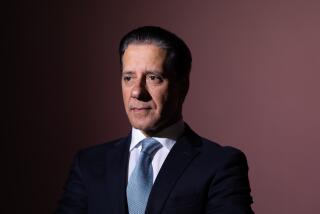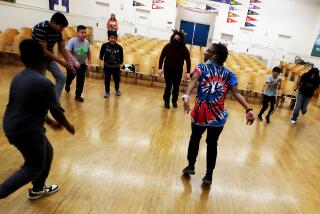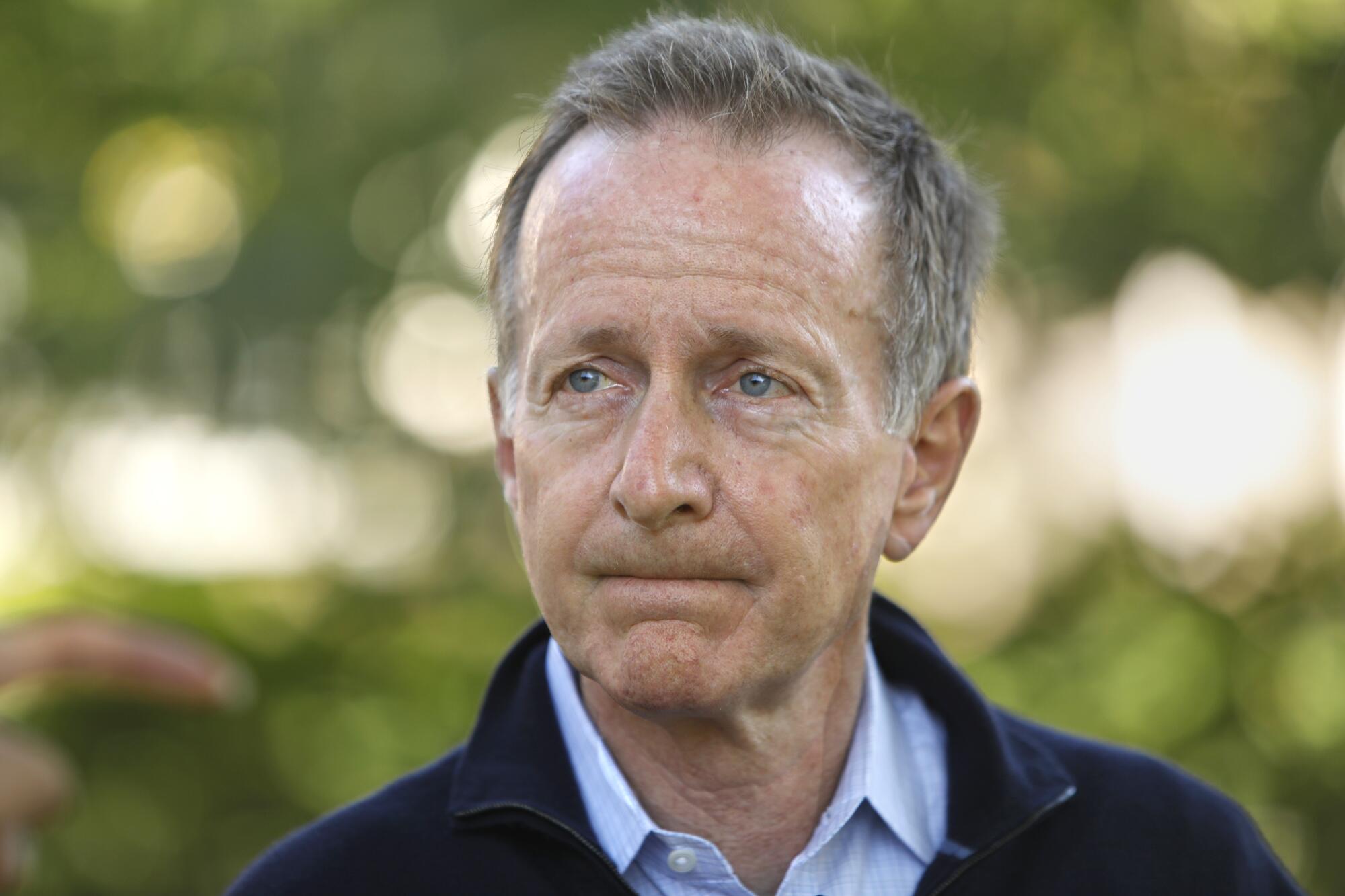
- Share via
On his first day as Los Angeles schools superintendent, Austin Beutner visited 11 campuses in 12 hours, boarding a school bus before dawn and later slinging aside his suit jacket to take afternoon batting practice. In his last weeks, he hopscotched around the reopened district, talking up summer school in South L.A. and showcasing robotics at Roosevelt High on the Eastside.
A former Wall Street executive with no experience in education management, Beutner wanted to see schools and be seen at schools; those visits, he said, energized him.
Yet his tenure would be defined by events outside the classroom, in ways no one imagined when he was appointed chief of the nation’s second-largest school district in 2018. At the time, he was seen as a controversial choice who, for better or worse, was going to shake things up.
Instead, the coronavirus pandemic threw the district into unprecedented turmoil. Using emergency powers granted by the Los Angeles Board of Education, Beutner became a crisis manager. He launched a massive food-distribution initiative and ambitious, school-based coronavirus testing. He was forced to take on suddenly critical questions: how to teach students online when they didn’t have computers or Wi-Fi, how to make classrooms safe from infection, how to balance the intense debate among parents and educators about when to reopen campuses.
He acted on his own and fast, forming alliances with the private sector, redeploying district resources and lobbying for aid. He also found common ground with the teachers union after a contentious strike that significantly marked the early part of his tenure.
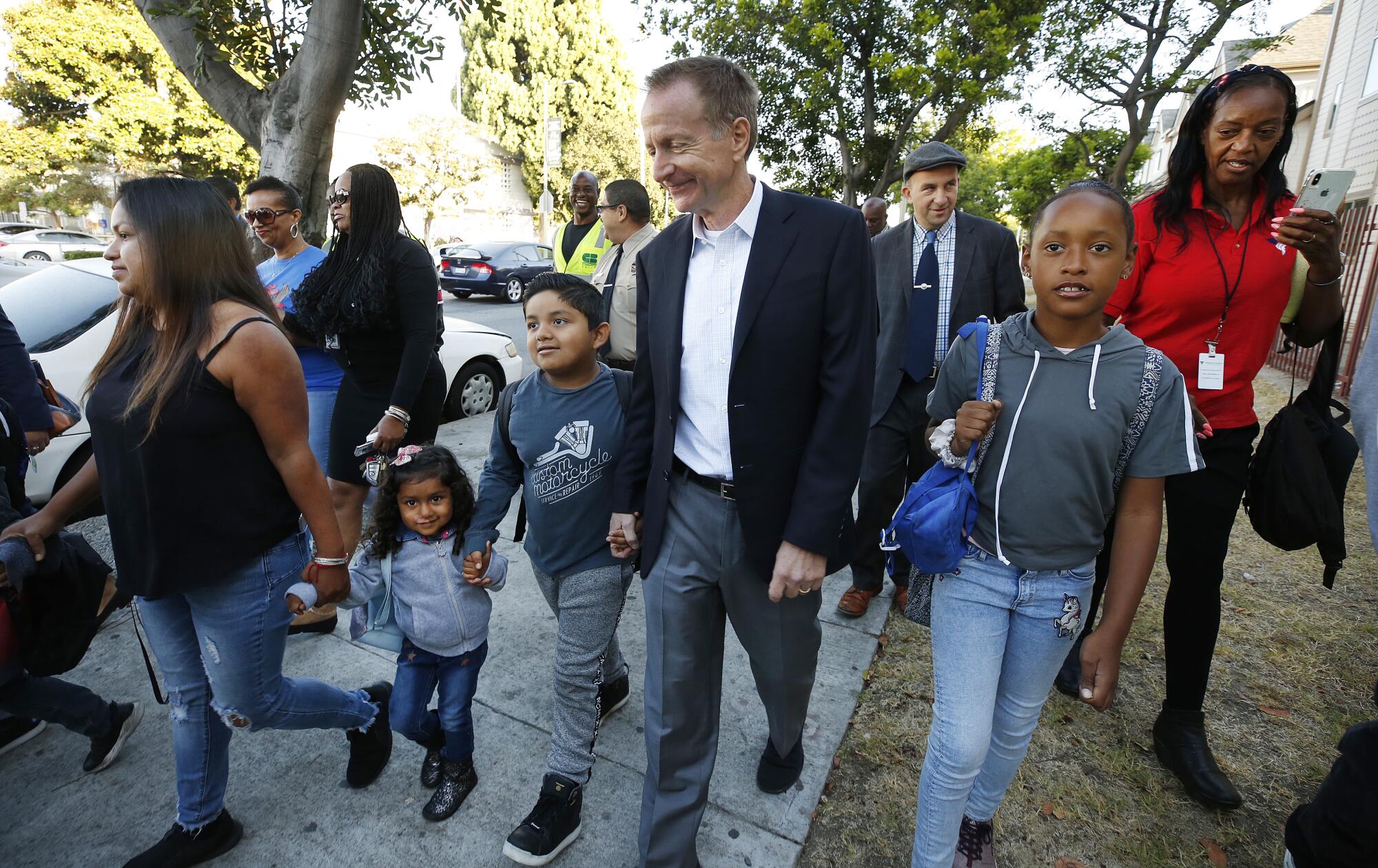
“Beutner’s most important contribution may be the way that LAUSD responded to the pandemic,” said Tyrone Howard, a UCLA education professor who also directs the university’s Black Male Institute. “Feeding children and families in an organized and comprehensive way was a huge success.”
But when it comes to leadership on academic achievement, “the pandemic really disrupted any long-term vision he may have had,” Howard said.
Beutner departs at a critical moment for the 465,000 students in kindergarten through 12th grade. On one hand, L.A. Unified is getting a flood of state and federal funding, helping an institution that has been facing long-term budget problems. But the pandemic magnified and, in many ways, worsened many long-standing problems and inequities.
And now L.A. Unified faces not only the steep challenge of academic recovery, but of addressing the pandemic’s mental health toll on students from social isolation, economic hardship and family illness and death. The pandemic hit disproportionately hard on the 80% of students from low-income families.
School board President Kelly Gonez said the district, with strong leadership from Beutner, managed to get through the last 16 months. But the next superintendent, she said, faces familiar challenges Beutner was unable to address — and likely many more.
“Over the last three years, L.A. Unified has become more adaptable and nimble in the face of crises, and has successfully brought in greater investment from our broader community and civic leaders to support our public schools,” Gonez said.
“We have become a district that is structured in a way that better puts its focus on supporting the success of our schools. But our schools grapple with stark inequities — predating Supt. Beutner — and the pandemic has only exacerbated and highlighted these disparities,” she said. “I don’t think that the district has done enough under the superintendent’s tenure to combat those in a meaningful way.”
Beutner thinks the credit for crisis management is appropriate, but that it overlooks headway on other major fronts. He cited a new reading and math initiative in the early grades, a significantly funded focus on Black students, a decentralization of district operations, and an improved connection with the region’s rich and powerful to better support public education.
“There’s a pattern that’s emerged over these past three years — ideas that are born and bred in our schools are becoming a model for the nation,” Beutner said. “We can all be proud of the progress.”
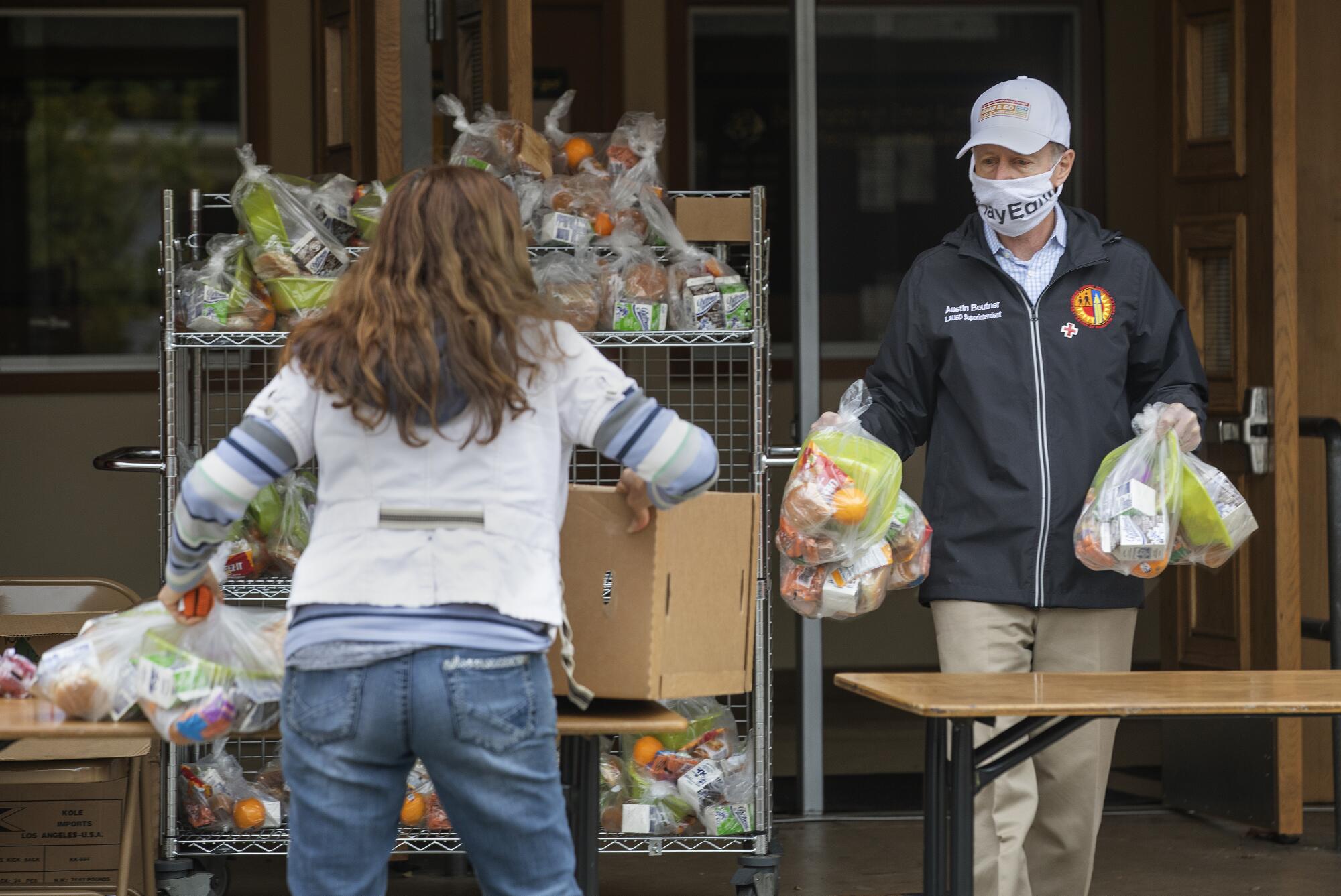
Crisis 1: The strike
United Teachers Los Angeles was deep into organizing for a strike when Beutner was hired in May 2018. He got the job based on a 4-3 vote in closed session to authorize contract negotiations with him to begin. His lack of education experience was a sticking point for dissenters. The narrow majority included Ref Rodriguez, who was facing prosecution on unrelated campaign finance violations and resigned soon after the Beutner vote.
The former investment banker — who previously had started a nonprofit to provide free glasses to students, served as deputy mayor of Los Angeles and worked as publisher of the Los Angeles Times for 13 months — sought the superintendent’s office as his next stop in a public service mission that began, he said, after he broke his neck in a mountain-biking accident.
The union seized on Beutner’s personal wealth and corporate background in accusing the district of hoarding money that it claimed should go toward raises and other classroom needs. But its more sweeping goal was to issue a clarion call for public education, part of a wave of teacher job actions across the country.
The strike spanned six days in January 2019. The public seemed to side with teachers — keeping children home from school, honking horns at intersections and turning out for picket lines.
A settlement was reached after L.A. Mayor Eric Garcetti stepped in to mediate. The union declared victory over the district and over Beutner, highlighting incremental progress toward smaller classes, campus-based social services and schools staffed with nurses and counselors.
Although anti-union critics have faulted Beutner for not more effectively opposing the union, he disputes that the teachers won: Members lost pay during the walkout, he noted, and the district did not increase its salary offer.
The strike, however, was always about something bigger than L.A. Unified, he said.
“Public schools’ struggle with adequacy is really fundamentally what the strike was about,” Beutner said. “It was about labor being heard. That the community, as a whole, understood public schools have not been adequately or properly funded in California for a long, long time. I agree with that 100%.”
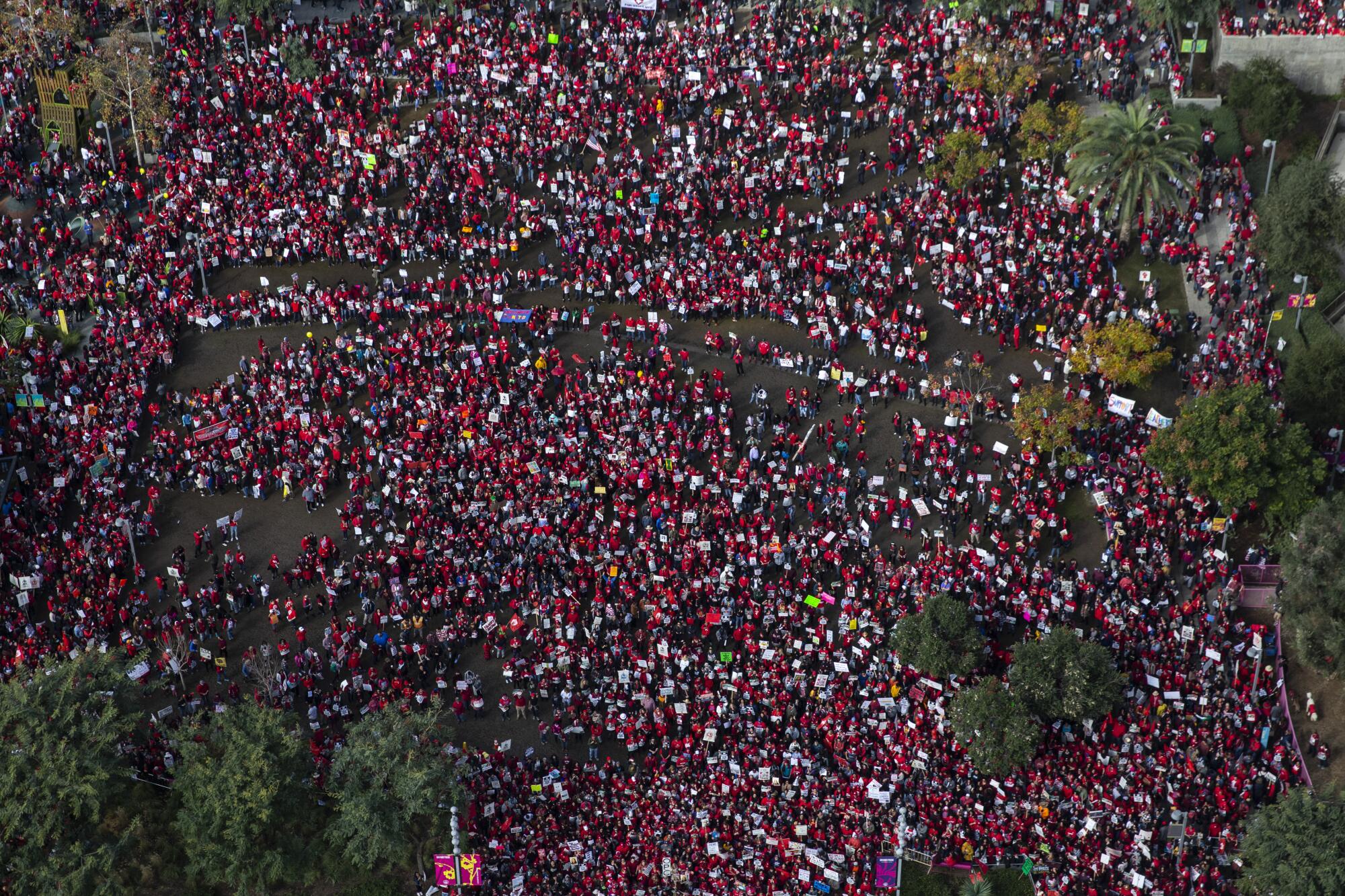
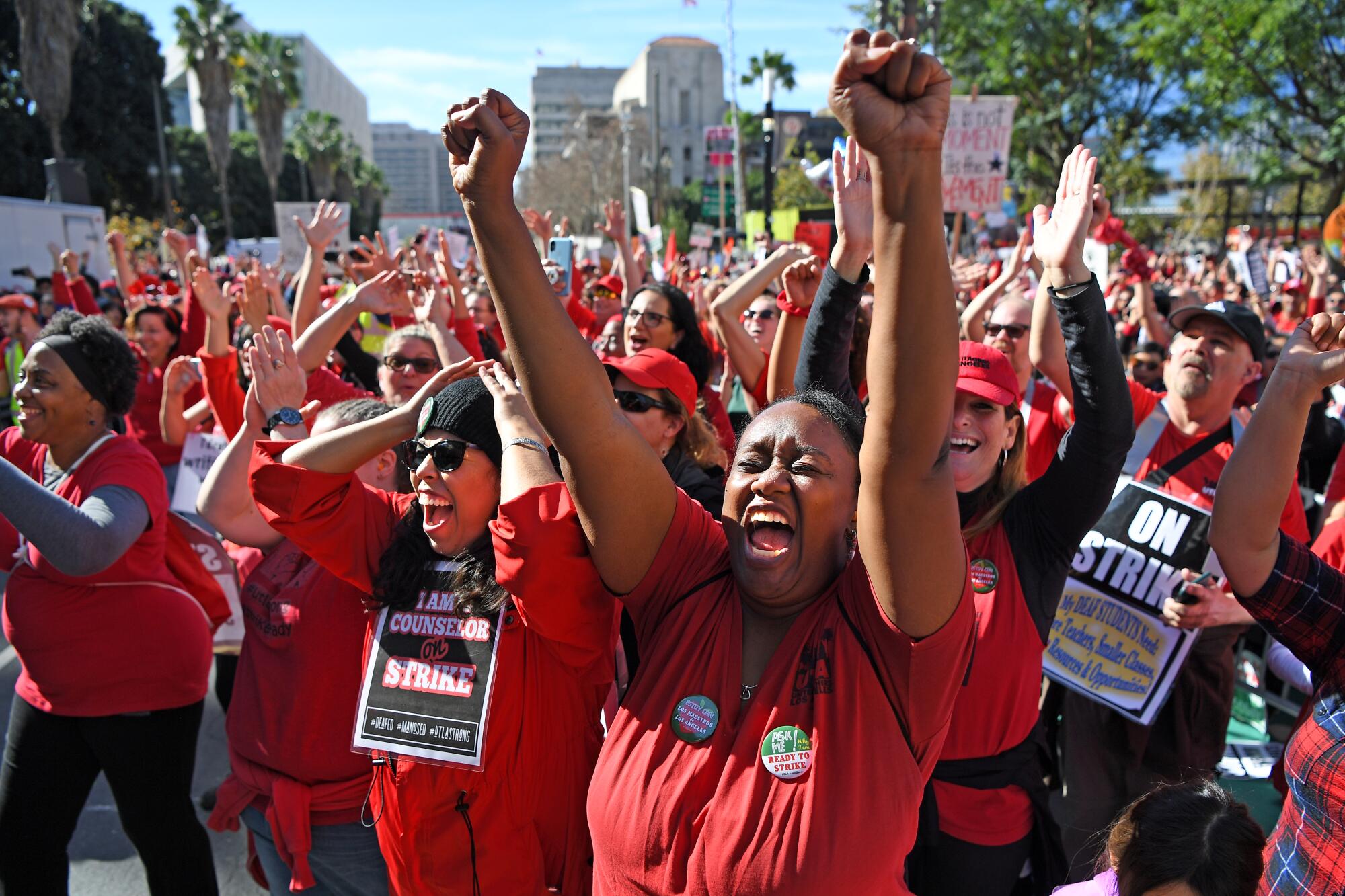
Teachers union leaders declined to comment on Beutner. However, an assessment was offered by Reclaim Our Schools L.A. — a coalition that includes UTLA; Students Deserve, composed of school-aged activists; and two pro-labor organizations.
“His skills as a corporate manager served LAUSD well in navigating the COVID-19 crisis, but his lack of experience as an educator was a persistent shortcoming,” said Jazmin Garcia, a Reclaim group parent leader. “His vision for reform focused on restructuring how the adults in the system work, not on students in the classrooms.”
After the strike, Beutner and the union tried to capitalize on pro-teacher sentiment by supporting a local parcel tax to increase school funding, marking a turning point of pragmatic cooperation between the two. Voters rejected the measure, though a later attempt at a school facilities bond was successful.
At the time of his hiring, Beutner had been opposed by employee unions, career educators and many parents who feared he would enact corporate management-inspired changes and undermine traditional public education. That never happened.
Beutner’s most common mantra — other than perhaps COVID safety — was his pitch for higher, sustained funding for schools.
Some never lost their wariness toward Beutner, but others gradually softened — including Principal Victorio Gutierrez, who got to know the superintendent from his visits to Simon Rodia High School in South Gate.
“Little by little I realized, well, maybe it was for the best,” Gutierrez said of Beutner. “We needed some fresh blood.”
Crisis 2: The pandemic
On Friday, March 13, 2020, L.A. Unified students were sent home with expectations of a two-week campus closure. The shutdown lasted more than a year.
The board of education immediately granted Beutner emergency powers that enabled him to issue orders without school board approval. He quickly authorized laptop purchases and then internet hot spots for students — technology paid for in part by spending down school-construction bonds.
Still, it took months for computers to reach all students. And the performance of the hot spots was frequently poor, due to limited broadband service in low-income communities — over which Beutner had no control.
Student engagement, grades and learning suffered — as they did in other school systems. For many months, Beutner seemed to struggle to acknowledge that backsliding. He emphasized, for example, how many students had connected online at least once; whereas parents, teachers and community groups reported serious problems with inadequate broadband and faltering student engagement.
New efforts to reach students included a partnership to expand educational public television programming and original online courses, such as one on the Titanic, with film director James Cameron, and ukulele and guitar lessons with donated instruments.
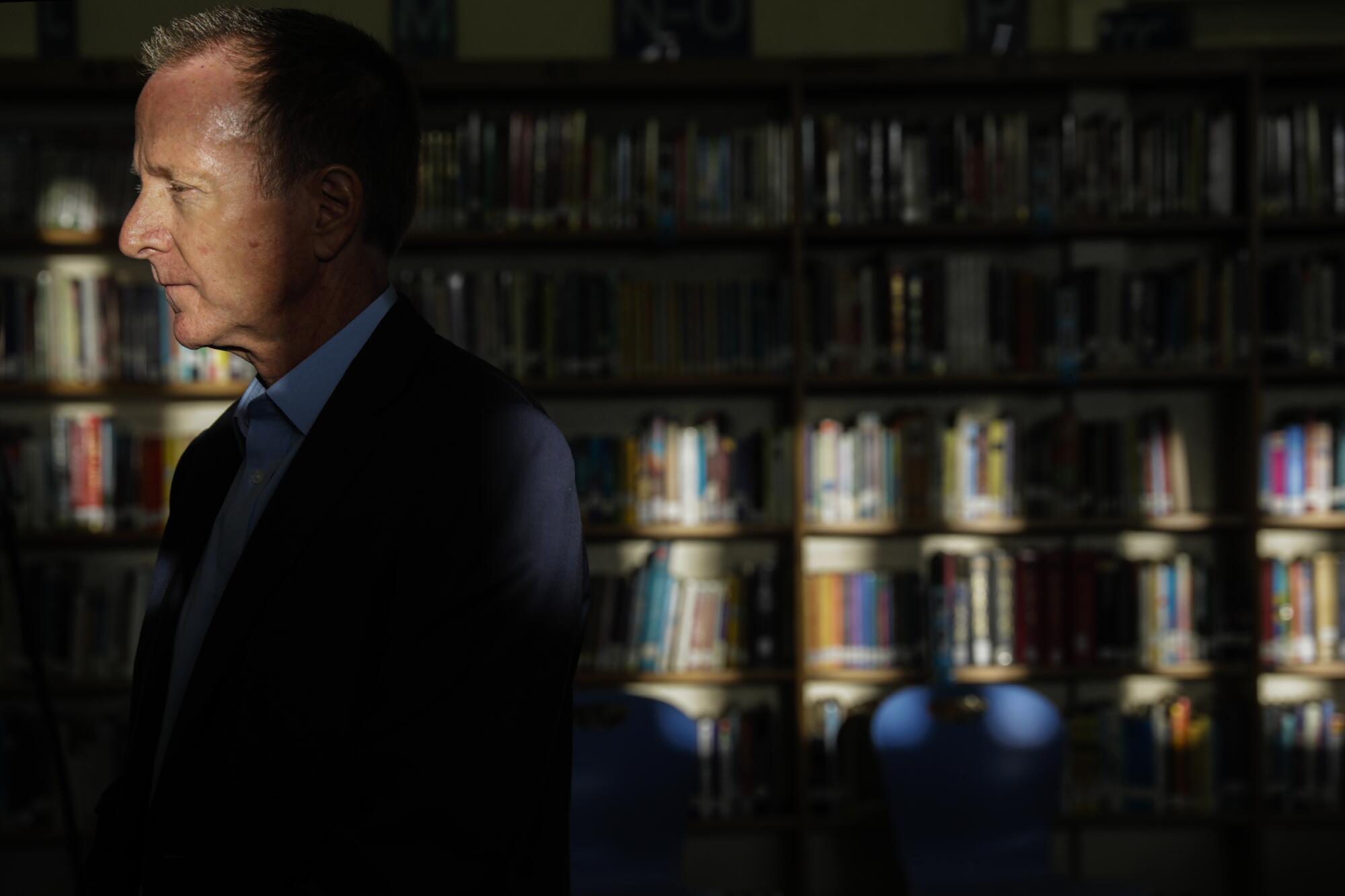
Receiving widespread praise was Beutner’s swift action to feed children and other community members. While the federal government has picked up the cost of feeding students, no one has reimbursed the district for about 30 million meals for adults, at an estimated cost of more than $100 million.
It was an effort that the superintendent enjoyed participating in.
Just before Christmas, he dressed up as an exceedingly thin Santa, handing out toys, books and food at Washington Preparatory High School in South L.A. District film crews documented the scene — and many others — burnishing his image as the face of the school system.
Another major effort was Beutner’s launch of district-run coronavirus testing for students and staff. While the program, which cost $120 million for the 2020-21 school year, was unable to fast-track campus reopenings, Beutner maintains it led to safer schools.
He also oversaw student and family vaccination efforts, as well as expanded campus cleaning, improved ventilation and updated school operation plans.
But some families grew increasingly frustrated. To them, the safety measures did not accomplish enough for students.
Early on, L.A. Unified provided less live online instruction than other major California urban school systems. Then, in the fall of 2020, the district did not seek waivers that would have allowed for the reopening of elementary schools in the earliest primary grades.
Around the same time, the state began to permit in-person services to students with high needs — including English language learners and children with disabilities. L.A. Unified moved more slowly than many other school systems and reached fewer than 1% of its students.
Beutner was criticized for moving too slowly and then for relying on teachers to volunteer after their regular workday to provide in-person services to students with special needs. Most teachers were not interested in the added workload — even for pay.

Some also accused Beutner of giving in too readily to demands from the teachers union — which successfully opposed the district’s request to have the online school day closely match the hours of a traditional day. The union also pushed back against a more rapid reopening of in-person services to students, citing health concerns.
“By capitulating to UTLA and denying public health experts’ determinations that children and teachers could convene safely in person with the right mitigation measures — all of which Beutner successfully put in place — the district denied the rights of those children who desperately needed in-person instruction,” said Katie Braude, chief executive of Speak Up, a local advocacy group that has clashed politically with the teachers union.
The superintendent insisted his emphasis was on safety in moving cautiously as knowledge of the virus evolved.
By early 2021, the debate shifted to reopening campuses for all. Employee unions wanted all their members to have the opportunity to be fully vaccinated against COVID-19 before that happened.
Some parents countered by pointing to federal and state guidelines, which advised that schools could be operated safely regardless of vaccination status. Eager for the option to return, they held rallies on the Westside and in South L.A. A new parents group sued to reopen campuses faster.
In counterdemonstrations, Reclaim Our Schools L.A. called for campuses to remain closed at a time of widespread COVID-19 infection.
Amid these tensions, Beutner said the state should take responsibility for mandating when campuses had to reopen. He also called for prioritizing COVID-19 immunization for school employees. And he declined to pressure union members to return before that could be accomplished.
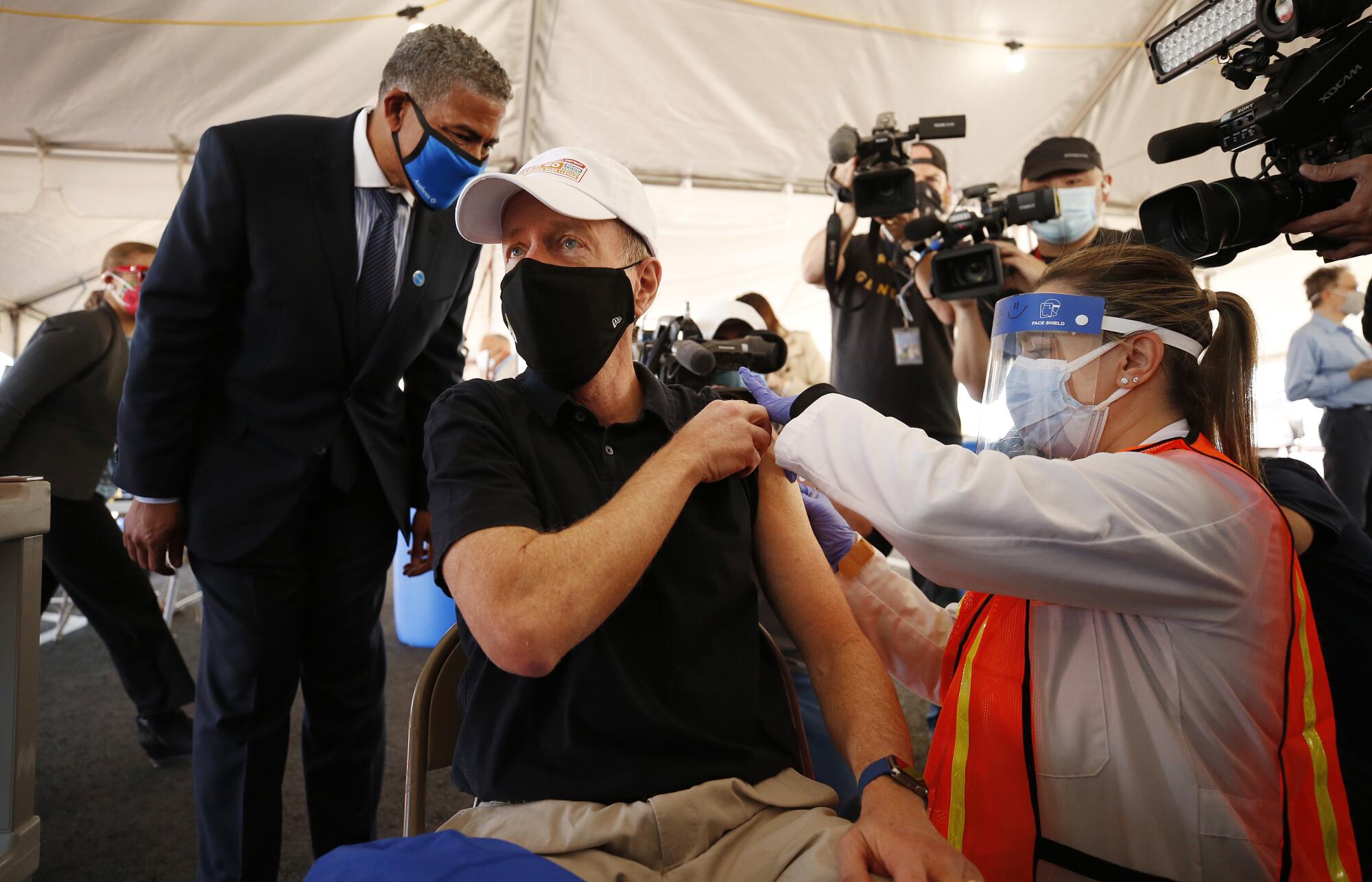
By March 1, state and county officials prioritized the vaccination of education workers. Many districts, including L.A. Unified, delayed reopening so that employees could achieve maximum immunity. As a result, Beutner did not reopen campuses till mid-April. Under county health rules, elementary schools could have opened two months sooner; middle and high schools one month sooner.
Ultimately, Beutner said, the delay in reopening was a short span in the big picture. During the reopening debate, and throughout the pandemic, Beutner managed to avoid confrontations with unions that flared in other places, including Chicago and New York City.
“Austin Beutner proved himself to be a learner,” said UCLA education professor John Rogers. “Following the strike, he adjusted his stance, and forged a working relationship with union partners.”
Former Long Beach and San Diego superintendent Carl Cohn sees things differently.
Beutner was excellent at operations and logistics, he said, “but if you view the superintendent’s most important job as getting high-quality instruction in front of the most vulnerable students, he was an abject failure.”
Once campuses reopened, the vast majority of parents did not send children back. Many from communities devastated by the pandemic expressed fears over safety. Others said they were dissatisfied with the part-time, belated return the district offered.
Looking back and forward
Beutner announced in April that he would not seek to remain superintendent when his three-year contract ended June 30. The district’s second-in-command, Dept. Supt. Megan Reilly, is serving as interim superintendent.
In explaining his decision, Beutner cited personal exhaustion and said he was leaving the district in a good position to make strides.
Those who supported his hiring saw a strong-willed outsider who would cut costs, support independent charter schools, curtail long-term budget risks, hold schools accountable for improved academic achievement and curb the influence of the teachers union.
Three years later, they are split over how well Beutner fulfilled those anticipated objectives.
“During the pandemic, given more executive authority and less impeded by the politics and bureaucracy, he was extraordinarily successful,” said attorney George Kieffer, a leader among the civic elite who backed Beutner.
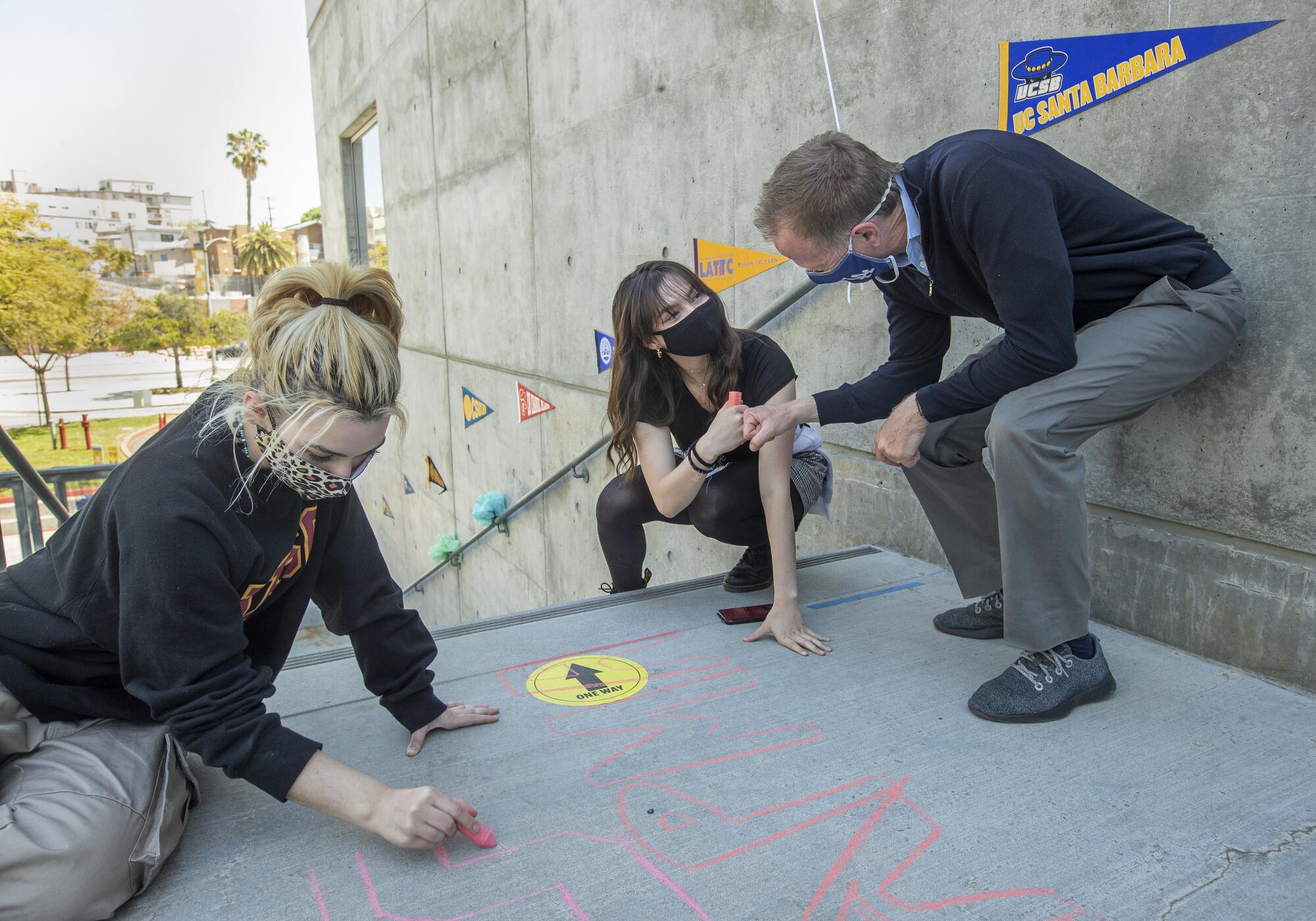
As school board members undertake a search for a new leader, some say they’d like an educator, perhaps someone with a background more in common with students, who are mainly children of color from low-income families. The next schools chief will have an unusual task: effectively spending unprecedented funding from pandemic relief aid and record state tax revenues. Board members have recently focused on setting goals to improve student academic progress.
Beutner was the right man for a period of crisis, said school board members Nick Melvoin and Jackie Goldberg.
Others say more progress was possible and point to Beutner’s lack of a strategic plan. They noted that his predecessor, the late Michelle King — who resigned because of illness — had one.
“We have no goals or comprehensive vision to evaluate against any efforts he may have led or announced,” said Ana Ponce, executive director of the advocacy group Great Public Schools Now. “Without a plan, it’s hard to know if any of his proclaimed efforts are working and impossible to know if they add up to a better set of opportunities for L.A.’s students.”
In defending his record, Beutner downplayed the importance of a strategic plan.
“That is what Los Angeles Unified has suffered from for decades — lots of plans, but no progress made,” he said. “I read all the plans; none of them were implemented. We’ve taken the other approach, which is: Do the work and the work will speak for itself.”
More to Read
Sign up for Essential California
The most important California stories and recommendations in your inbox every morning.
You may occasionally receive promotional content from the Los Angeles Times.

